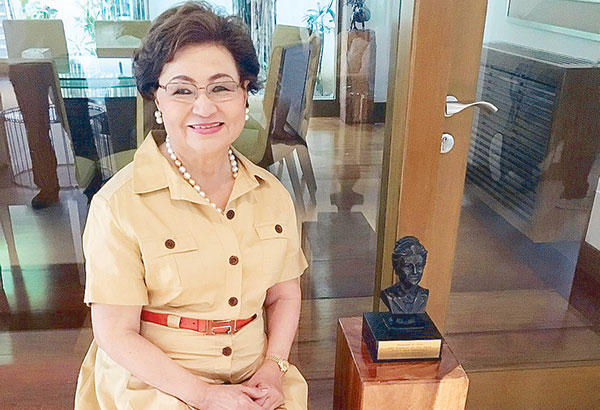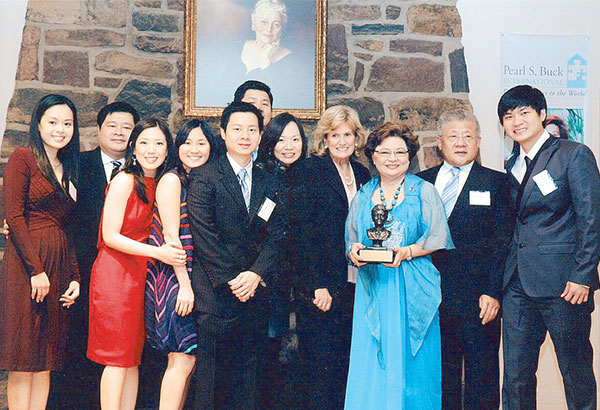Yes, Wee can!

W Group vice chairperson Rosalind Wee.
When businesswoman and carrageenan queen Rosalind Wee hits a golf ball nowadays, she thinks of the tumor that was excised from her brain in a life-threatening procedure 26 years ago.
“My tumor was already as big as a golf ball! That’s why I play golf now. Before my surgery, I never played golf. I didn’t have the money, golf is very expensive,” Rosalind says.
Hitting away regularly at a golf ball also symbolizes how, all her life, she has swept away obstacles on her path — with deft strokes and concentration.
Rosalind is vice chairperson of the W Group (which has six buildings in the Bonifacio Global City in Taguig) and the founder of a company that manufactures food stabilizers and binders using carrageenan as base material. Rosalind’s Marine Resources Development Corp. exports 6,000 tons of carrageenan yearly.
This would not have been possible if she didn’t survive the operation that left her legally blind but alive.
“I had a brain tumor on my optic nerve that I didn’t know I had. It was just by accident that I found out when my mom had cataract surgery and I asked her doctor, ‘Pwede ba isingit mo ako?’. He examined my eyes and saw the tumor but he didn’t say anything because it was not his expertise.”
Her doctor referred her to another specialist who told her that she had a tumor on her optic nerve. Eyes wide open, she asked the young doctor, “Doc, magaling ka ba?” She didn’t believe him because she felt no symptoms.
She had an MRI and forgot to get the results. Her sister got them for her one day and was told by the radiologist, “Ma’am malalim po, mahirap po.”
“My sister went to my office while I was very busy and she showed me the results. My tumor was already as big as a golf ball!”
Her husband Lee Hiong Wee told her after she broke the bad news to him, “Let’s go home.”
“I was at the peak of my research on food ingredients, formulations for ice cream, ham, sausages, chocolate drinks and pharmaceutical products. I had penetrated the local market against foreign companies,” she recalls. It is hard to pause when one is on a roll. But Rosalind had no choice.
So for the first time in a long, long time, Rosalind and her husband put down their work and went straight home to their house near a squatters area in Tatalon, Quezon City.
“We sat there for quite a while, not talking to each other because we didn’t know what to do anymore because it’s a brain tumor, you have to open the brain. So finally, I talked to my doctor in Manila, who was the best doctor at that time. I asked him to let me go to his teacher in New York, and he did. I went to New York, my doctor in New York said he was not sure of the surgery because it was difficult surgery — it was suprasellar. It was below the basement of the brain, so you have to go through the brain to see it and he told my husband he wasn’t sure. My husband got so angry and said, ‘Doc, you know we came all the way from the Philippines and you tell me you don’t know?’ And he was the head of the Neurological Institute of New York, the best in America. You know what he said? ‘Only God can do it. So you better pray’.” The Wees and all their prayer warriors stormed the heavens with their pleas.
But after 14 hours in surgery, during which the surgeons found out that the tumor had wrapped itself around her carotid artery, Rosalind opened her eyes. But she couldn’t see clearly. She was legally blind.
“I didn’t have peripheral vision, I can only see one half of you, very limited,” she shares, then hastens to add, “But I’m a very good golfer. I scan my surroundings.”
But the only thing she cannot do now that a person with good vision can is drive.
“I cannot drive. That’s it. I started driving when I was 14. But people might bump me, not me bumping people. No defensive driving for me.”
Despite her visual impairment, Rosalind never lost her vision and her focus. She grew from their living room a small handicraft business that now includes carrageenan products and six W buildings in BGC.
* * *
An AB Math major from FEU, Rosalind taught Math (with Mandarin as the medium of instruction) in Jolo, Sulu (her birthplace), then at Xavier School in Greenhills, San Juan (among her students was the French Baker’s Johnlu Koa).
“Few people study Math so I took up Math. Then I became a teacher and I went into business inside the house, because if you are a teacher you’re afraid to resign to go into business. Even if you’re an employee, you’re afraid to lose your job and start your business. If you fail, you can’t go back to your job anymore. So, what my husband and I did after work was handicrafts.”
They also produced tie-dyed T-shirts. They sold seashells fashioned into decorative items for the home.
One day, an American from Hawaii asked the Wees if they could look for seaweed called Eucheuma cottonii.
“That kind of specie is needed to process carrageenan. I said yes and I’m from Sulu. We found it. The seaweed can be cultured, you can manipulate it. Before, it took three months to harvest, now only 45 days. And a family can have like an income of P100,000 from seaweed per month. You can be rich.”
The seaweed, which Rosalind calls “gold from the ocean,” brought on a tidal wave of blessings for the Wees. Including seaweed farmers, a total of three million people also derive their income from the Wees’ carrageenan business.
 Rosalind receives the prestigious Pearl S. Buck ‘Woman of the Year’ award in 2009, then becoming only the 27th woman to receive the award. With her are (from left) Audrey Wee, Norman Wee, Dimples Wee, Heidi Gloria Maris W. Gregorio, Francis Wee, John Wee (partly hidden), Elaine Wee, Pennsylvania State Rep. Katharine Watson, Lee Hiong Wee and Cesar Wee Jr.
Rosalind receives the prestigious Pearl S. Buck ‘Woman of the Year’ award in 2009, then becoming only the 27th woman to receive the award. With her are (from left) Audrey Wee, Norman Wee, Dimples Wee, Heidi Gloria Maris W. Gregorio, Francis Wee, John Wee (partly hidden), Elaine Wee, Pennsylvania State Rep. Katharine Watson, Lee Hiong Wee and Cesar Wee Jr.* * *
Aside from being a businesswoman and an avid golfer, Rosalind proudly announces that she’s also a movie actress! She has starred in the Mano Po series and recently in This Time I’ll Be Sweeter, starring Barbie Forteza and Ken Chan. She plays the part of a “pakialamera” Chinoy businesswoman, a friend of the leading man’s parents.
But the roles outside her home that she relishes most is that of treasurer of the Quezon City Red Cross and president of the Pearl S. Buck Foundation Philippines Inc.
Rosalind is one of only 33 women (including the late former President Corazon Aquino and former US Secretary of State Hillary Clinton) who have received the Pearl S. Buck Woman of the Year Award, which she bagged in 2009 for her humanitarian work.
“I believe education is one way, if not the only way, out of poverty,” states Rosalind, whose education in Manila was financed by a good neighbor — literally — in Sulu, where she was born to a Christian-Muslim family. Because she was the 10th of 14 children, her education was not a priority. But she promised her parents that after her graduation from FEU, she would return to Jolo and teach. “That’s why I’m with the Pearl S. Buck Foundation because we are in education. I want to give free education to small children more than the high school students. High school students can already work and at the same time, study. But small children, they have no way to do it, they are helpless. That’s my priority.”
Though the foundation has 560 scholars, Rosalind also gives scholarships that she personally finances. “Our sponsors from the US are almost old. So when they die and a student is graduating from high school, I take over the responsibility from my own pocket.”
So, you really believe education transforms lives, I ask.
“Because that was me,” replies the lass from Jolo who found an ocean of possibilities with seaweed and swam the distance to reach the shores of her ambition.
(You may e-mail me at [email protected].)
- Latest




























